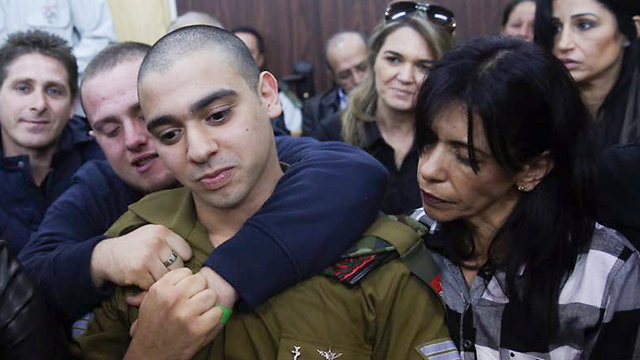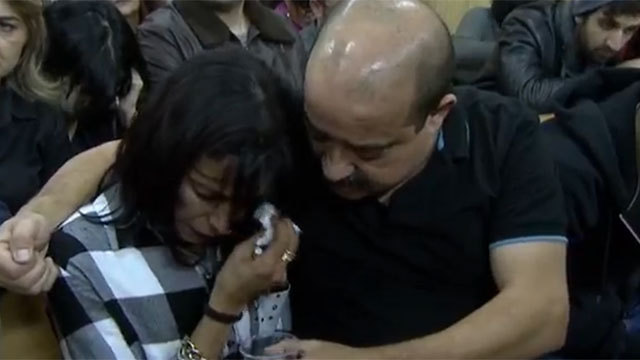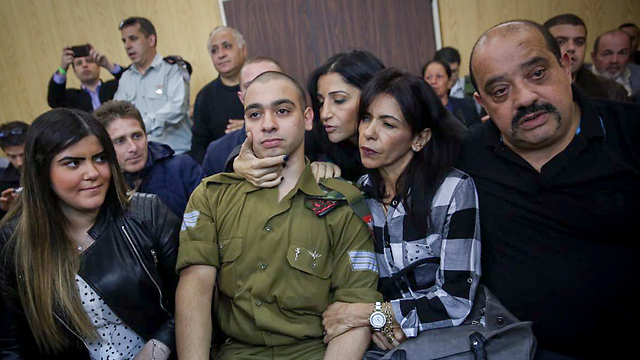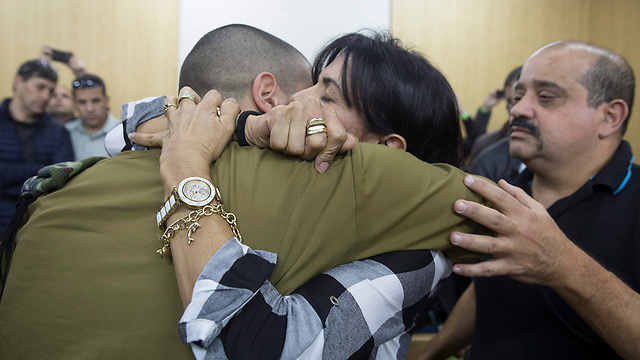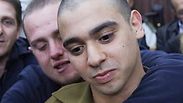
Sgt. Elor Azaria was convicted by unanimous decision of manslaughter on Wednesday morning after shooting dead a seriously wounded terrorist who carried out a stabbing attack just moments earlier in Hebron last year. Azaria will be sentenced in about a month and could face several years in prison.
"He opened fired in violation of orders, the terrorist did not pose any threat," the three judges wrote.
The shooting was captured on camera by a resident of the city, causing a stir and major debate within the country—reaching the highest political and military echelons—about the conduct of the IDF and its commanders in the field.
Azaria sat emotionless as the verdict was delivered.
One of Azaria's relatives was thrown out of the courtroom while a second relative stormed out after the verdict was read out.
A young woman called the verdict a disgrace and screamed "the Israeli military is over!" before she was thrown out of the courtroom. Another woman screamed "disgusting leftists!" and stormed out.
Speaking outside the courtroom after the verdict had been announced, Defense Attorney Ilan Katz told reporters: “We respect the court and will learn from the decision. We will obviously appeal.”
Israeli journalist and former lawmaker Sharon Gal, who serves as a spokesman for the Azaria family, blamed the court of ignoring the evidence indicating the soldier was innocent.
"It was like the court was detached from the fact that this was the area of an attack. I felt that the court picked up the knife from the ground and stabbed it in the back of all the soldiers," he told reporters.
The prosecutor said the verdict was "important, clear, decisive and speaks for itself."
"I feel good. It is fair. This is an achievement of the court that it condemned the soldier," said Yousri al-Sharif.
Al-Sharif gathered with his family in his home to watch the verdict being read live on Israeli television.
"I was exhausted and tense," he said. "I smoked two packs of cigarettes while watching the verdict."
'No justification for the shooting'
Judge Heller emphasized that "the verdict is based solely on the evidence brought forth (in the trial)" amid repeated claims from Azaria's supporters that senior IDF leadership, politicians, the media and even public opinion could influence the ruling.
“There is no question that the defendant shot from close range after aiming his gun at the terrorist’s head and there is no dispute that by doing so he endangered the lives of those around him,” she stated.
She also sought to debunk what she described as conflicting claims made by the defense teams. "The defendant tried to hold the rope at both ends—on the one hand he claimed the terrorist moved and on the other that he was already dead before he (Azaria) shot him," she noted.
“There was no justification for the shooting. The fact that there was a terrorist on the ground who sought to take the lives of soldiers did not justify disproportionate action,” she insisted. “Azaria’s shooting was inconsistent with the rules of opening fire.”
Addressing Azaria's state of mind before and after the shooting, Judge Heller said that "there is no dispute regarding the veracity of the statements made by the soldier T.M. who testified to the IDF Criminal Investigation Division (CID) that Elor told him during the incident 'How is it that my friend was stabbed and the terrorist is alive.'
"There is no cause to suspect Cpl. T.M. tried to falsely accuse the defendant, they are friends. The defendant did not bring up with T.M. the explosive (he thought the terrorist had) and the knife (that was on the ground by the terrorist's body) as a reason for the shooting. His words to T.M. show there was another reason for shooting the terrorist."
Judge Heller pointed out that "it appears that during his CID interrogation, the defendant was aware of the things Cpl. T.M. presented. It is not for no reason that he denied having that conversation with T.M. at the beginning of his interrogation. When he was offered to confront T.M., the defendant set conditions for the confrontation. Despite what he said during his testimony, he repeated the claim that he didn't recall any conversation with T.M. before and after the shooting except for asking him to look after his helmet."
“When he was asked to address the claim that the motive for the shooting was revenge he instantly chose not to respond. We saw fit to dismiss his explanation and we have decided that after the shooting, he said in Cpl. T.M’s ear, ‘they stabbed my friend and tried to kill him—he deserves to die.’”
In her analysis, Judge Heller determined that “this statement has significant weight in the decision.”
Turning to what she deemed conspicuous discrepancies in the version of events presented by the defendant and the testimony provided by Company Commander Maj. Tom Na'aman, Heller said: “We gave full weight to the version of the Company Commander against the problematic version by Azaria. The defendant changed his version and testimony, including about the conversation he had with the Battalion Commander Lt. Col. David Shapira, whose testimony is credible in our opinion.
"Azaria did not distance others and didn’t warn his friends. It is not clear why the defendant removed his helmet if he feared an explosive device as he claimed. Azaria did not know how to explain his conduct. Moreover, his conduct after the shooting was not consistent with his claims that he feared a danger.”
Azaria’s parents, Charlie and Oshra, left their home in Ramla in the early morning and arrived at the court in the Kiryah (IDF headquarters) in Tel Aviv for the verdict, greeted by hundreds of people who had turned up to stand in solidarity with the IDF sergeant.
Among those in the crowds of around 150 people—which had grown to 400 by 11am—were activists from the far right-wing Lahava group, Beitar Jerusalem soccer fans and members of the criminal, soccer fan group La Familia, some of whom began rioting as the tension mounted.
As Azaria entered the courtroom, those nearby clapped their hands, while calling out expressions of support: “We love you and God loves you,” they shouted.
Azaria’s mother, Oshra, burst into tears following the court’s decision: “This was a foregone conclusion,” she yelled as she turned to one of the prosecutors in the case. “You continue to smile. One day you will also have a child.”
Elor hugged his crying mother as they left the room together through the back entrance.
Azaria has spent the nine months of the trial under open detention at his brigade's base near Rosh HaAyin, where he has been doing maintenance work.
If convicted, the Military Advocate General's Office has considered asking the court to send Azaria to prison immediately without waiting for the sentencing.
Itay Blumenthal, Gilad Morag, Asaf Zagrizak, Attila Somfalvi, Amit Cotler and AP contributed to this report.















